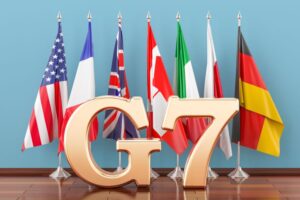
G7 countries have agreed with the United States to exempt American and British companies from additional taxes, Reuters reported on Saturday.
In particular, the group has created a “side-by-side” system in response to the US administration’s agreement to withdraw its proposal to introduce a tax in response to Section 899 of President Donald Trump’s tax and spending bill, according to a statement from Canada, which chairs the G7.
The US Treasury Department also said that the “parallel system” agreed with the G7 could preserve important achievements within an inclusive framework in the fight against tax base erosion and profit shifting.
“Today’s agreement provides much-needed certainty and stability for these companies after they expressed their concerns,” said Finance Minister Rachel Reeves, adding that work must continue to combat aggressive tax planning and tax avoidance.
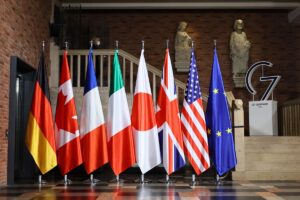
The G7 leaders have agreed to provide $50 billion in loans to Ukraine, according to a joint statement.
The Group of Seven leaders have agreed to provide Ukraine with $50 billion in loans through the Emergency Revenue Acceleration mechanism.
“This money will be serviced by future proceeds from the immobilization of Russian sovereign assets in accordance with the G7 legal systems and international law. Disbursements are planned to be made through various channels, including budgetary, military and reconstruction assistance to Ukraine,” the statement said.
The leaders expressed their gratitude for the timely implementation of this historic decision and noted the constructive participation of the European Union in reaching the agreements.
It is stated that the G7 reaffirms its commitments made at the Puglia summit and focuses on supporting Ukraine in the face of Russian aggression, which has caused significant damage to the Ukrainian people.
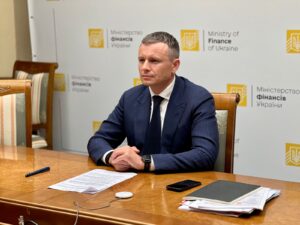
The Minister of Finance of Ukraine Sergii Marchenko and his Deputy for European Integration Yurii Draganchuk presented their vision and plans for the further implementation of the customs reform to the ambassadors and representatives of the G7 missions in Ukraine.
“The goal is to transform the Ukrainian customs into the eastern border of Europe according to EU standards and at the same time strengthen its security function… We are interested in building an efficient, high-tech and transparent customs, which will take time, informed decisions and consolidated support,” Marchenko said in a release from the Ministry of Finance on Thursday.
It is specified that the discussion concerned the steps taken by the Ukrainian government to develop and reform the State Customs Service, as well as the concept of transparent selection of customs management.
The Ministry of Finance emphasized that reforming the State Customs Service is one of Ukraine’s priorities in the process of integration into the EU.
According to the Ministry, in the first seven months of 2024, the State Customs Service exceeded its revenue plan by 5.2%, or UAH 16.4 billion, and customs revenues to the state budget amounted to about UAH 329 billion.
The customs reform is envisaged by the Plan of Ukraine under the EU’s Ukraine Facility, the National Revenue Strategy for 2024-2030, and is also one of the structural beacons under the IMF’s EFF Extended Fund Facility program.
The Ministry of Finance added that it continues to actively work on the implementation of EU customs legislation and the development of a new Customs Code, as well as on the introduction of IT and other common customs procedures to develop foreign economic activity and simplify business.
“I am convinced that further support for the reboot of the Ukrainian customs with the support of international experts will be crucial for the effectiveness of this process,” Draganchuk said.
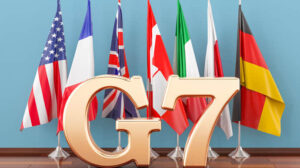
G7 finance ministers discusssed options for using interest from frozen Russian assets to help Ukraine. Kyiv has stepped up its appeals for more international financial aid to fight off Moscow’s invasion.
Finance ministers from the G7 group of wealthy democracies on Saturday cited “progress” but no breakthrough in talks on how to use frozen Russian assets to support Ukraine as it continues to battle invading Russian forces.
The meeting of the G7 ministers in the northern Italian city of Stresa focused mainly on the question of how to find more funds for Ukraine as Russia presses on with a new offensive in the Kharkiv region in the third year of its unprovoked invasion.
The G7 and its allies froze some $300 billion (€276 billion) of Russian assets shortly after Moscow launched a full-scale invasion of its neighbor in February 2022.
The meeting comes after the EU this week formally approved a plan to use interest from the Russian assets it has frozen, estimating that this could produce up to €3 billion annually for Ukraine.
What did ministers say about the talks?
The G7 finance ministers did not report any final agreement on using Russian assets on Saturday.
“We are making progress in our discussions on potential avenues to bring forward the extraordinary profits stemming from immobilized Russian sovereign assets to the benefit of Ukraine, consistent with international law and our respective legal systems,” the ministers said in a final statement.
The ministers reiterated that Russian assets will remain frozen “until Russia pays for the damage it has caused to Ukraine.” They also raise the possibility of imposing further sanctions on Moscow.
Italian Finance Minister Giancarlo Giorgetti said that the ministers had faced technical and legal issues, but were hoping to present a proposal before a G7 leaders’ summit next month in Puglia, Italy.
“We do not deny the difficulties but there is a firm determination to arrive at a solution,” he said.
What kinds of plans were discussed?
French Finance Minister Bruno Le Maire said ministers aimed to “reach a political agreement in principle” and not a ready-made solution.
A draft statement from the meeting seen by the Reuters news agency said: “We are making progress in our discussions on potential avenues to bring forward the extraordinary profits stemming from immobilized Russian sovereign assets to the benefit of Ukraine.”
The statement contained no figures or details, reflecting the fact that several legal and technical issues need to be resolved before such loans could be made.
Any detailed agreement would require the approval of G7 leaders, who meet next month in Puglia, Italy.
The United States, for its part, has been urging its G7 partners — Japan, Germany, France, Britain, Italy and Canada — to create a loan facility for Ukraine backed by future interest generated by the frozen Russian assets.
That proposal, which could raise $50 billion in the short term for Kyiv, raises several questions, including who would issue the debt and the apportioning of risk between the G7 partners.
At the end of the meeting, US Treasury Secretary Janet Yellen said that a loan for Ukraine backed by the income from frozen Russian sovereign assets is the “main option” for G7 leaders to consider in June but added that she doesn’t want to “take anything off the table as a future possibility.”
The ministers will be joined on Saturday by Ukraine’s finance minister, Serhiy Marchenko.
Source : https://www.dw.com/en/g7-makes-progress-but-no-deal-on-russian-assets-for-kyiv/a-69181131
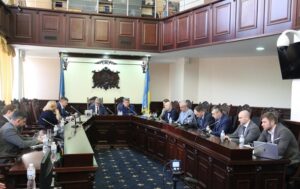
The new leadership of the High Qualifications Commission of Judges (HQCJ) should be virtuous and independent, the Italian Presidency of the G7 Ambassadors Support Group in Kiev said in a statement published on social network X on Thursday.
“The G7 Ambassadors are closely following the news of the High Qualifications Commission of Judges and call for a transparent selection process for the new leadership, which should be virtuous and independent. Advancing reforms and filling the courts with vetted judges is critical to public confidence in the judiciary and private sector investment,” the statement reads.
According to Interfax-Ukraine, on March 27, the HQCJ granted the application of the commission’s chairman, Roman Ihnatov, to dismiss him from the position of a member of the commission at his own request. He had been heading the commission since June 6, 2023.
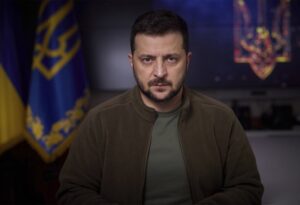
President of Ukraine Volodymyr Zelensky said that he had agreed with German Federal Chancellor Olaf Scholz on the urgent convening of the G7 group.
“Agreed with Olaf Scholz, Chancellor of Germany, presiding over the G7, to convene an urgent meeting of the group. My speech is planned, in which I will talk about the terrorist attacks of the Russian Federation. We also discussed increasing pressure on Russia and helping to rebuild damaged infrastructure,” he tweeted on Monday.